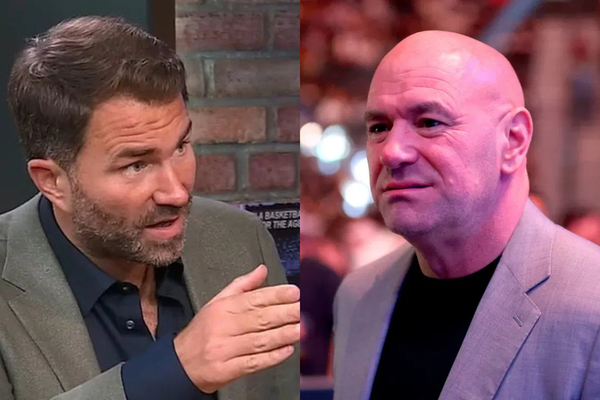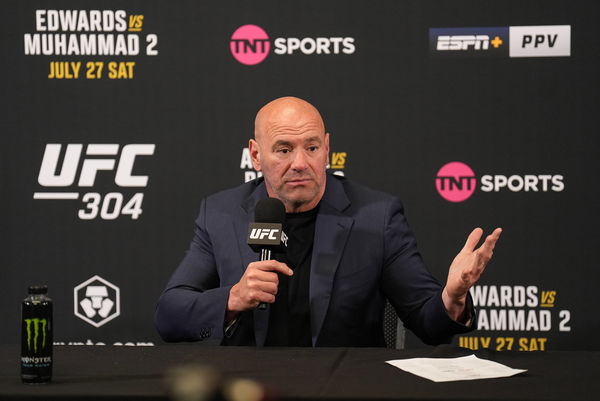

The Ali Revival Act has stirred intense debate across the boxing world. With each passing day, new opinions, both in support and opposition, continue to surface. The proposed legislation seeks to revise the Muhammad Ali Boxing Reform Act, a federal law introduced 25 years ago to safeguard the rights and interests of professional fighters. On July 23, the Ali Revival Act was formally introduced in the U.S. Congress, with the stated aim of addressing ongoing challenges in the sport of boxing. However, the proposal has raised eyebrows. Critics argue it could pave the way for UFC-style centralized control in boxing.
Watch What’s Trending Now!
So the concerns stem from the bill’s purported backing by TKO Group. The parent company of both UFC and WWE recently entered the boxing arena through a partnership with Turki Alalshikh’s Riyadh Season. Dana White‘s new boxing promotion hosts its first event: the Canelo-Crawford showdown this September. Prominent boxing promoter Eddie Hearn has voiced strong reservations. In his view, the Ali Revival Act may be less about reform and more about furthering corporate interests under the guise of regulation.
In an exclusive with ‘Boxing Scene,’ the Matchroom Boxing head expressed his concerns. Hearn emphasized the importance of the original Muhammad Ali Act. So any effort to revise or dismantle it reflects poorly on those pushing for change. Especially if it tips the balance of power further away from fighters.

Imago
June 27, 2022, New York, NY, New York, NY, United States: NEW YORK, NY – JUNE 27: Eddie Hearn addresses the media at the NYC press conference, PK, Pressekonferenz ahead of the September 17th bout at T-Mobile arena between Saul Canelo Alvarez and Gennady GGG Golovkin on June 27, 2022, in New York, NY, United States. New York, NY United States – ZUMAp175 20220627_zsa_p175_009 Copyright: xMattxDaviesx
“I don’t think we need more power in the promoter’s hands. I think we need to respect the fighter. And I think that act is nearly always there to protect the fighter and make sure they’re not taken advantage of. And I think to try and change that act or get it slung out isn’t a good look from a fighter’s perspective,” Hearn said.
Hearn called out what he sees as hypocrisy. Attempts to revise or repeal the Act have raised suspicions among many athletes. Some feel concerned and even betrayed. He didn’t mince words: “For those guys, it’s about ownership and control.” Moreover, a franchise-style model like the UFC’s is unlikely to succeed in boxing. The sport, he stressed, follows a structure where fighters are independent and promoters help guide their careers, not dictate them.
According to Hearn, lower-tier or less established fighters may accept any opportunity that comes their way. But elite-level boxers are unlikely to simply follow orders.
Amid the backlash, a chorus of approval
Top-tier fighters typically have greater control over their careers, and experienced teams are unwilling to surrender their autonomy easily to them. Still, the Ali Revival Act has its supporters, including Lonnie Ali, widow of Muhammad Ali, and the Association of Boxing Commissions. Some of the proposed amendments have drawn interest for their fighter-friendly provisions: a $150 per round minimum purse, $25,000 in injury coverage per bout, new protections for training-related injuries, comprehensive anti-doping and anti-betting policies, and the removal of ranking or title fight fees.

Imago
UFC CEO DANA WHITE with post event media during the UFC 304 event at Co-op Etihad Campus, SportCity, Manchester, England on the 27 July 2024. Copyright: xAndyxRowlandx PMI-6350-0002
But it’s the issue of the Unified Boxing Organizations (UBOs) that has become a major point of contention. Reports suggest these bodies would operate alongside established sanctioning organizations such as the WBC, WBA, and WBO. Reportedly, one proposed UBO appears to be Zuffa Boxing, helmed by UFC President Dana White. The real concern, however, is whether such entities would mirror the UFC’s centralized, top-down structure, where a single promotion controls fighters’ contracts, salaries, scheduling, and titles.
That concern is not unfounded. Just recently, the UFC agreed to a $380 million settlement in a class-action lawsuit brought by former fighters who competed between 2010 and 2017. These athletes claimed they were underpaid and restricted by the UFC’s monopolistic practices. Following the settlement, individual fighters received payouts ranging from $100,000 to $1 million.
It’s important to note that the Ali Revival Act remains a bill, not a law. For the time being, fans will have to stay tuned as new developments unfold.
What’s your take on the Ali Revival Act? Is it a much-needed reform or a step toward monopolizing a historically diverse sport?

